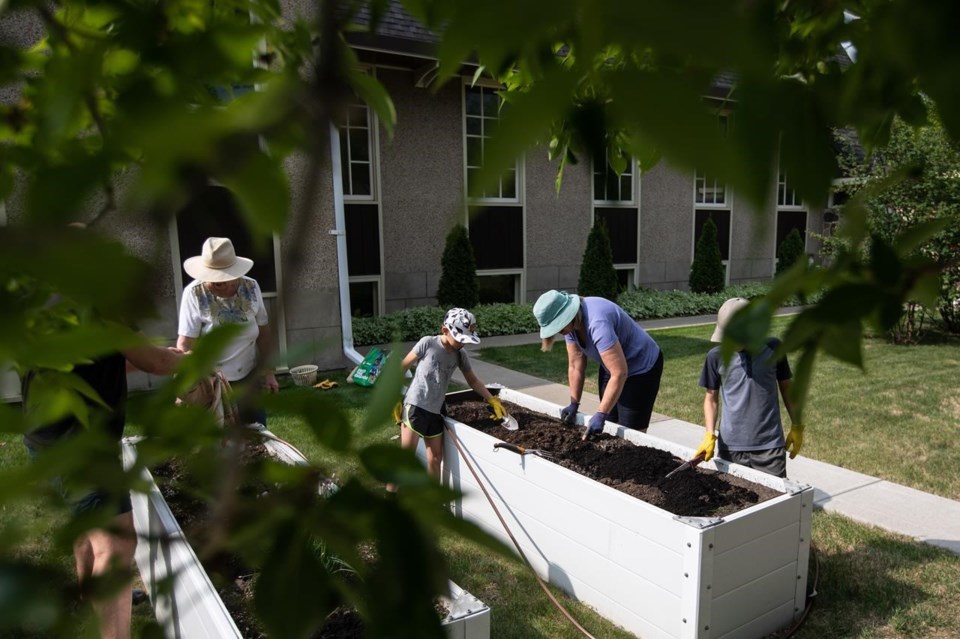EDMONTON — Reid Garrin says he has fun gardening at his local church because he gets to dig in the dirt, but the 12-year-old also knows the work is important.
"I'm gardening for the food bank this year," says Reid, plowing dirt with a trowel. "I think it's a good idea so people without food can eat."
Every spring, Reid joins his friends and neighbours at a small community garden in the front yard of St. David's Anglican Church in central Edmonton to grow fresh produce that eventually gets donated to food banks.
At the end of every season, Reid says he loves to see how "there's always food afterwards."
Judy Yawney, a coordinator with Edmonton's Food Bank, says there is growing support for community gardens, a trend that picked up during the COVID-19 pandemic.
"People are starting to see the impact of the price (at) the grocery store," says Yawney. "So, we're seeing more people working on the community gardens, and are automatically planning an extra row now to support us."
A 2022 Hunger Count report shows food bank use from 2019 to 2022 shot up by 73 per cent in Alberta.
Yawney adds it is "always great" to see where food comes from know the community can come together and support itself "rather than thinking we have to go to the grocery store."
This year, a batch of seeds sown at local community gardens was donated by a group of fourth-grade girls from a local public school who wanted to grow fruits and vegetables and help food banks.
"Fresh food is expensive now, so we wanted to get fresh produce to people who need it from the food banks," said Sophie Quinn, a nine-year-old student at Laurier Heights School.
"We think that having fresh, locally grown produce is important … because it makes everyone feel like they're a part of something bigger."
Sophie and her two friends, Olivia Diep, 10, and Kiera Petterson, 9, won $600 in seed money in a Rotary Club business pitch competition in early spring.
They decided to turn that seed money into actual seeds that could grow fresh produce for families in need. The girls named the initiative Growing Goodness.
Olivia says growing produce was a better idea than buying it from a grocery store or investing in plants.
She says the team decided to sell seeds and ask people to donate a portion of their fresh veggies to a local food bank.
Their work started with buying wholesale seeds for vegetables with a longer shelf life — beans, carrots, beets, peas and zucchini — packaging those seeds, designing the logo for their brand and setting up a stall with lemonade at a community hall.
They raised about $1,000 and sold all 84 packs of seed, including to a client in Saskatchewan.
Keira, who designed the garden signs and logo, says she and her friends also spent a day getting their hands dirty at Edmonton's Food Bank community garden.
But their job isn't over yet.
"We're going to have a pickup date at a community hall," said Keira. "We're going to thank all our customers and then drive to the food bank and deliver the food that has been grown in the people's garden."
The pickup drive is to be held around the harvest season.
Sara Petterson, Sophie's mother, says the project was a fantastic way to teach kids the value of serving the community, having a connection with food and "seeing the fruits of your labour."
"They were willing to put in the work, which was amazing."
Food banks are not just worried about giving people food, but making sure it's nutritious, said Arianna Scott, chief executive officer of Food Banks Alberta.
"We know that nutrition plays such a high role in people's success in coming out of poverty and overcoming whatever obstacles they're facing in their life," she says.
Scott says donations from seasonal gardens help to offset budgets for food banks by a significant amount.
Meanwhile, Keira, Sophie and Olivia say they were happy to see their small business idea "can make a big difference."
This report by The Canadian Press was first published June 12, 2023.
___
This story was produced with the financial assistance of the Meta and Canadian Press News Fellowship.
Ritika Dubey, The Canadian Press




